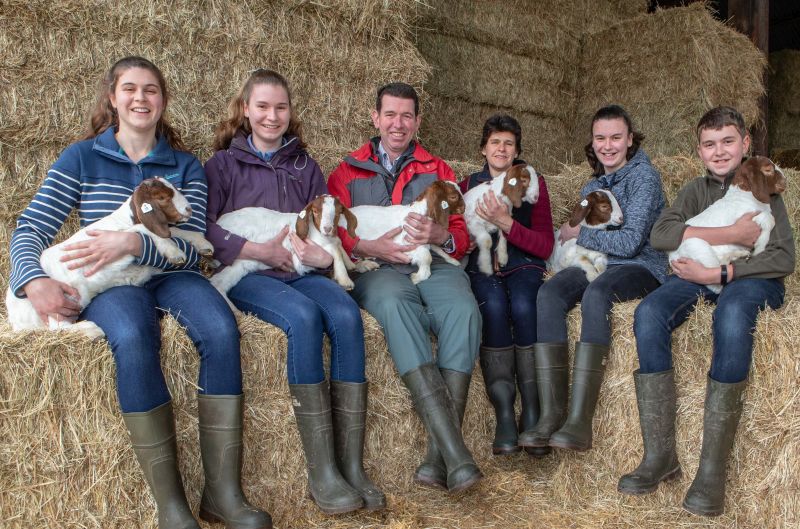
A farming family are diversifying into rearing their very first herd of Boer goats at their Berkshire farm as demand for the meat increases.
Third generation farmers James and Lucy Hewison, who farm at Hartley Court Farm on the Englefield Estate, are diversifying into goats as their meat is tipped to become a future food trend.
Last year, the couple invested 10 breeding does, four doelings, four bucklings, and a breeding buck called Bruno.
They are currently in the process of doubling this as kidding gets underway at their farm, which is located near the village of Three Mile Cross to the south of Reading.
Goat meat makes up around 60 per cent of the red meat consumed worldwide yet is one of Britain’s lesser consumed meats despite being rich in protein and low in cholesterol. As with lamb, the meat is ready at six months old.
Tipped for the mainstream food market in BBC Good Food magazine’s food trend predictions for 2019, goat dishes are on the menus of some British restaurants, although not yet widely available in supermarkets.
Encouraging goat meat onto the tables of British households will help minimise the number of male goats being euthanised in the UK each year, estimated at around 100,000, because of the lack of demand for meat compared with the demand for goats’ milk and cheese.
“Goat meat is a growing market and farmers across Britain are always having to think of ways to create other sources of income, and we’ve got four children, so we’re always thinking about farming for the future,” explained Lucy.
“I came across an article about goat rearing around the same time as I was due to leave my job as a teaching assistant in a local primary school, and it seemed the perfect way to use our traditional farm buildings.”
'Steep learning curve'
In addition to restoring the buildings for the goats, the farmers also had to become accustomed to their idiosyncrasies.
“We knew a lot about cows, sheep and horses, but absolutely nothing about goats,” added Lucy, “so, it’s been a very steep learning curve.”
“The perception is that goats want to eat everything. This isn’t true, although they do like to try and eat things you don’t want them to.”
She added: “It’s been quite a challenge to find them exactly what they like to eat in addition to grass. We tried out different types of hay and found a particular type of haylage that they like.
“And they’re escapologists, so we’ve had to do some serious fencing too, because they’ll try and get out if they can.”
Originally a dairy and arable farm when James’ grandfather first became a tenant in 1953, the Hewisons now look after a 40-strong herd of Aberdeen Angus suckler cows and their calves, and two pedigree Angus bulls alongside 214 hectares of wheat, barley, poppies and grass.
The Englefield Estate is a community of farms, woodlands, residential and commercial properties covering 14,000 acres in Berkshire and Hampshire.
There are 23 let farms, covering 3,500 hectares of commercial forestry, a Home Farm of around 1,700 acres, 330 residential properties and 150 small commercial business premises.
